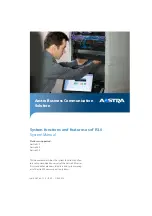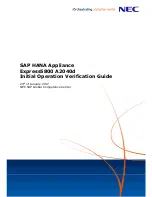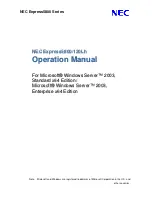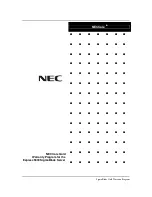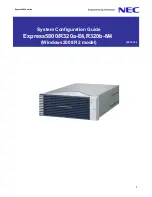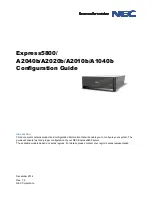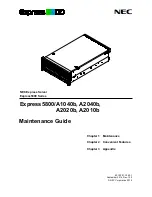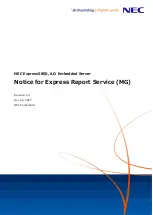
Chapter 7: BIOS
7-9
7-8
SUPERSERVER 8048B-TRFT USER'S MANUAL
DCU IP Prefetcher
If this feature is set to Enable, the IP prefetcher in the DCU (Data Cache Unit) will
prefetch IP addresses to improve network connectivity and system performance.
The options are
Enable
and Disable.
DCU Mode
Use this feature to set the data-prefecting mode for the DCU (Data Cache Unit).
The options are
32KB 8Way Without ECC
and 16KB 4Way With ECC.
Direct Cache Access (DCA)
Select Enable to use Intel DCA (Direct Cache Access) Technology to improve the
efficiency of data transferring and accessing. The options are
Enable
and Disable.
DCA Prefetch Delay
A DCA Prefetcher is used with a TOE (TCP/IP Offload Engine) adapter to prefetch
data in order to shorten execution cycles and maximize data processing efficiency.
Prefetching data too frequently can saturate the cache directory and delay neces-
sary cache access. This feature reduces or increases the frequency the system
prefetches data. The options are [8], [16],
[32]
, [40], [48], [56], [64], [72], [80], [88],
[96], [104], [112], [120].
Extended APIC (Advanced Programmable Interrupt Controller)
Based on Intel's Hyper-Threading architecture, each logical processor (thread) is
assigned 256 APIC IDs (APIDs) in 8-bit bandwidth. When this feature is set to En-
able, the APIC ID will be expanded from 8 bits to 16 bits to provide 512 APIDs to
each thread to enhance CPU performance. The options are
Disable
and Enable.
AES-NI
Select Enable to use the Intel Advanced Encryption Standard (AES) New Instruc-
tions (NI) to ensure data security. The options are
Enable
and Disable.
Down Stream PECI (Platform Environment Control Interface)
Select Enable to allow the client server to interact with the host server directly to
achieve better host-client communication in the PECI platform, which will result
in power saving and energy use efficiency. The options are
Disable
and Enable.
Advanced Power Management Configuration
Advanced Power Management Configuration
Power Technology
Select Energy Efficient to support power-saving mode. Select Custom to cus
-
tomize system power settings. Select Max Performance to optimize system
performance. Select Disabled to disable power-saving settings. The options
are Disabled,
Energy Efficient
, and Custom. If the option is set to Custom, the
following items will display:
CPU P State Control (Available when Power Technology
is set to Custom)
EIST (P-states)
EIST (Enhanced Intel SpeedStep Technology) allows the system to automatically
adjust processor voltage and core frequency to reduce power consumption and
heat dissipation. The options are Disabled and
Enabled
.
Turbo Mode
Select Enabled to use the Turbo Mode to boost system performance. The options
are
Enabled
and Disabled.
P-state Coordination
This feature is used to change the P-state (Power-Performance State) coordi-
nation type. P-state is also known as "SpeedStep" for Intel processors. Select
HW_ALL to change the P-state coordination type for hardware components only.
Select SW_ALL to change the P-state coordination type for all software installed
in the system. Select SW_ANY to change the P-state coordination type for a soft-
ware program in the system. The options are
HW_All,
SW_ALL, and SW_ANY.
CPU C State Control (Available when Power Technology
is set to Custom)
C2C3TT (C2-to-C3 Transaction Timer)
This feature is used to set the transaction timer from C2 to C3. Enter 0 for Auto,
which will allow the BIOS to configure the transaction timer automatically. The
Default setting is
0 (Auto)
.
Package C State limit
Use this item to set the limit on the C-State package register. The options are
C0/1 state, C2 state,
C6 (non-Retention) state
, and C6 (Retention) state.
CPU C3 Report
Select Enable to allow the BIOS to report the CPU C3 State (ACPI C2) to the
operating system. During the CPU C3 State, the CPU clock generator is turned
off. The options are Enable and
Disable.
Summary of Contents for SuperServer 8048B-TRFT
Page 1: ...USER S MANUAL Revision 1 0a SuperServer 8048B TRFT...
Page 15: ...2 10 SUPERSERVER 8048B TRFT USER S MANUAL Notes...
Page 29: ...4 20 SUPERSERVER 8048B TRFT USER S MANUAL Notes...
Page 46: ...5 32 SUPERSERVER 8048B TRFT USER S MANUAL Notes...
Page 52: ...6 10 SUPERSERVER 8048B TRFT USER S MANUAL Notes...
Page 79: ...7 52 SUPERSERVER 8048B TRFT USER S MANUAL Notes...
Page 81: ...A 2 SUPERSERVER 8048B TRFT USER S MANUAL Notes...































